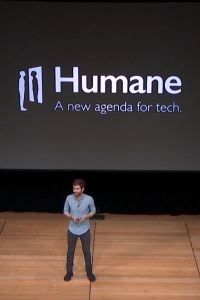Join getAbstract to access the summary!

Join getAbstract to access the summary!
Tristan Harris
Humane
A New Agenda for Tech
Center for Humane Technology, 2019
What's inside?
Technology must be based on a more sophisticated understanding of human nature.
Recommendation
Tristan Harris, dubbed the “closest thing Silicon Valley has to a conscience” by The Atlantic magazine, argues convincingly that the world’s most sophisticated digital platforms – YouTube, Facebook, Google, and the like – are designed to “downgrade humans.” Happily, the bleak situation Harris outlines isn’t irreparable. What if technology companies shifted their focus from vying for people’s attention to helping individuals become the best versions of themselves? Harris explains how the tech industry and society can accomplish this pivot.
Summary
About the Speaker
Tristan Harris, a former design ethicist at Google, is the director and co-founder of the Center for Humane Technology and co-founder of the Time Well Spent movement.






















Comment on this summary